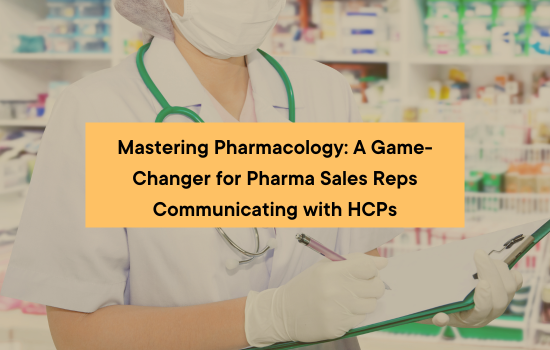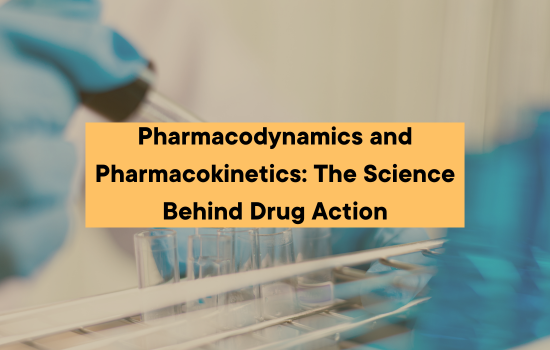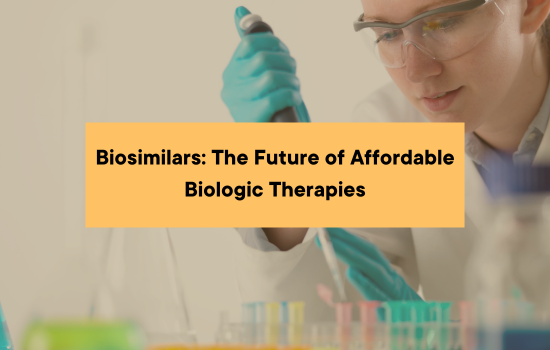Pharmacology is one of the most fundamental aspects of medication therapy. The absorption, distribution, metabolism, elimination, and mechanism of action of each drug must be considered by all healthcare professionals (HCPs) when deciding the best treatment regimen for their patients, making it a crucial factor in a drug’s development and success in the market. Without this information, providers can’t ensure the safety or efficacy of the medications they prescribe. Lacking this fundamental understanding as a sales rep can negatively impact a provider’s interest in a new product and their business relationship with the company. [1]
How can mastering pharmacology give sales reps a competitive advantage when meeting with prospective HCPs?
Pharmacology Knowledge in Action: Real-World Scenarios for Sales Rep Success
In a hypothetical scenario, a pharmaceutical sales rep is discussing a new drug with a physician. The physician expresses concern about the accumulation of the drug in patients and possible interactions with other medications, especially in older patients with comorbid conditions and diminishing organ systems. He asks the sales rep several detailed questions about how the drug is absorbed, how it binds to its target receptors, how it’s metabolized, how it’s eliminated from the body, and how long it stays in the system. The sales rep only learned the market value of the drug and beneficial results of their company’s clinical trials and is unable to provide an adequate answer and instead recommends the physician refer to the company’s resources for the information. The physician reiterates how busy he is taking care of patients and that he doesn’t have the time to research this and eventually loses interest in the product. Due to limited knowledge of pharmacology, the sales rep failed to properly communicate and was unable to address the physician’s concerns. He returned to the company with no feedback, missing out on an opportunity and damaging credibility, ultimately having a negative impact on future business.
In an alternate scenario, this same physician is meeting with a sales rep from a different pharmaceutical company to discuss their new drug product. Once again, the physician’s main concern is the drug’s accumulation and prolonged concentration in his patient population, and he asks the sales rep to tell him about the drug’s binding, metabolism, and elimination. This sales rep, a Certified Pharmaceutical Representative, explains the drug’s full mechanism of action including its target receptors, then discusses its metabolism to its inactive metabolite via liver enzymes and renal elimination. The rep also elaborates on this concern with clinical trial results showing no significant side effects in older adults due to prolonged drug concentrations or toxicities. The physician sees that the sales rep has a good understanding of pharmacology to answer his questions and is more willing to voice his concerns. He asks a follow-up question to see if there are any drug interactions based on the product’s liver metabolism, and the sales rep can identify a specific enzyme it induces and some examples of medications that may be affected. The sales rep offers to look into that further to identify any other interactions that may be more common in the physician’s patient population. The physician asks the sales rep to stay in touch with any updates or findings.
This knowledgeable and proactive approach not only builds the physician’s interest in the product but also strengthens the trust and professional relationship between the provider and the company, paving the way for future collaboration and business opportunities, and directly contributing to the sales rep’s success.
Pharmacology’s Role in Drug Marketing:
In both scenarios, the sales rep was informing the HCP about a new drug product and its shown benefits based on the clinical trials. The difference was, when asked about the details of the drug specifically, only one sales rep was able to adequately respond. As a result, the HCP wanted to inquire further about the drug, felt comfortable voicing his concerns knowing they’d be heard and understood, and was more willing to stay in touch about the product.
A sales representative with knowledge of pharmacology can communicate more effectively with healthcare professionals and is better equipped to recognize and address the barriers that prevent prescribers from adopting and marketing the products. Pharmaceutical sales teams with these well-informed or certified representatives give their companies a competitive edge in the market, allowing them to surpass the standard and show prospective HCPs that they put in the extra work and care to present their product and health information effectively and in detail. As mentioned, an understanding of a drug’s pharmacodynamics and pharmacokinetics, as well as its mechanism of action, is significant in the eyes of an HCP as it helps providers draw a connection from the product to their patient population so sales reps can better understand their clients’ needs. It also helps these companies to improve their product and their marketing since the reps can communicate any issues they hear, in detail, from the providers to the manufacturers, resulting in a superior formulation.
There are also proactive ways to use this data for a sales pitch, such as:
- Emphasizing a new mechanism of action or a metabolic pathway that produces fewer side effects compared to its competitors
- Addressing concerns up front that might be relevant to the physician’s patient population so more time can be allocated to lesser-known obstacles
- Providing maximum doses/infusion rates so the provider knows the product’s therapeutic range and toxicity potential
Certification as a Pharmaceutical Sales Representative:
A career as a pharmaceutical sales representative does not require a license or certification, but being certified ensures that a sales rep is well-versed in pharmacology before they step out into the field. ACMA offers two accredited certification programs that prepare representatives with knowledge of the pharma industry, the drug development process, healthcare economics and, most importantly, pharmacology. The Pharmaceutical Representative Certification (PRC) and the Certified Specialty Pharma Professional (CSPP) programs aim to “establish a baseline level of knowledge in core clinical areas” including pharmacology and mechanism of action, as a foundation of their content. [2] [4] [5]
The National Association of Pharmaceutical Sales Representatives also stresses the importance of understanding pharmacology to communicate effectively with physicians about their products, as it has become a standard of the industry, and sales experience alone is not enough to detail providers with the information that matters to them. Pharmaceutical companies value that certification when hiring new sales reps, while HCPs see that certification and those credentials and know that they are speaking to someone who will understand their perspective and convey it accurately to these drug manufacturers. [3] [6]
Conclusion: The Importance of Pharmacology and HCP Communication
Healthcare providers are the key customers for these drug manufacturers and their products. Effective communication between both groups is essential for breaking down barriers of access to their intended markets and minimizing issues to the target patient population. As pharmaceutical sales reps are directly in contact with both, they need to be able to bridge the gap between these two sides with a clear understanding of what each side wants. Pharmacology sits at the heart of drug therapy and determines how every patient gets treated, so having that same knowledge base sets a foundation for further discussion between the sales rep and the HCP and enables the representative to appropriately reflect the provider’s thoughts and feelings to the manufacturer. Detailed communication like this will keep HCPs in contact with these representatives knowing that their voices are being heard, and it will provide insightful feedback to the pharmaceutical companies to improve their products so they can reach more clients. Mastering pharmacology maximizes interactions between drug developers and healthcare providers, leading to better drug products and better patient outcomes.
References:
1. American Society for Pharmacology and Experimental Therapeutics (ASPET). Explore Pharmacology. 2022. https://www.aspet.org/docs/default-source/education-files/aspet_explore-pharmacology-2022_final7d540af399986662b1a8ff0000ef3f42.pdf?sfvrsn=1bcc6cd3_0
2. Coursera Staff. A Guide to Pharmaceutical Sales Jobs: Salary, Resume, and Skills. Nov. 2023. https://www.coursera.org/articles/pharmaceutical-sales-jobs
3. Pharma Sales. Mastering the Path to Pharma Sales Success: Your Ultimate Guide. Feb 2024. https://www.pharmasalestraining.org/2024/mastering-the-path-to-pharma-sales-success-your-ultimate-guide/
4. Pharma Sales Training. CSPP Program Information. Nov. 2023. https://www.pharmasalestraining.org/cspp-program-info/
5. Pharma Sales Training. PRC Program Information. Jan. 2021. https://www.pharmasalestraining.org/program/
6. The National Association of Pharmaceutical Sales Representatives. CNPR Pharmaceutical Sales Program. Accessed January 7, 2025. https://www.napsronline.org/cnpr-pharmaceutical-sales-program/
How can mastering pharmacology give sales reps a competitive advantage when meeting with prospective HCPs?
Pharmacology Knowledge in Action: Real-World Scenarios for Sales Rep Success
In a hypothetical scenario, a pharmaceutical sales rep is discussing a new drug with a physician. The physician expresses concern about the accumulation of the drug in patients and possible interactions with other medications, especially in older patients with comorbid conditions and diminishing organ systems. He asks the sales rep several detailed questions about how the drug is absorbed, how it binds to its target receptors, how it’s metabolized, how it’s eliminated from the body, and how long it stays in the system. The sales rep only learned the market value of the drug and beneficial results of their company’s clinical trials and is unable to provide an adequate answer and instead recommends the physician refer to the company’s resources for the information. The physician reiterates how busy he is taking care of patients and that he doesn’t have the time to research this and eventually loses interest in the product. Due to limited knowledge of pharmacology, the sales rep failed to properly communicate and was unable to address the physician’s concerns. He returned to the company with no feedback, missing out on an opportunity and damaging credibility, ultimately having a negative impact on future business.
In an alternate scenario, this same physician is meeting with a sales rep from a different pharmaceutical company to discuss their new drug product. Once again, the physician’s main concern is the drug’s accumulation and prolonged concentration in his patient population, and he asks the sales rep to tell him about the drug’s binding, metabolism, and elimination. This sales rep, a Certified Pharmaceutical Representative, explains the drug’s full mechanism of action including its target receptors, then discusses its metabolism to its inactive metabolite via liver enzymes and renal elimination. The rep also elaborates on this concern with clinical trial results showing no significant side effects in older adults due to prolonged drug concentrations or toxicities. The physician sees that the sales rep has a good understanding of pharmacology to answer his questions and is more willing to voice his concerns. He asks a follow-up question to see if there are any drug interactions based on the product’s liver metabolism, and the sales rep can identify a specific enzyme it induces and some examples of medications that may be affected. The sales rep offers to look into that further to identify any other interactions that may be more common in the physician’s patient population. The physician asks the sales rep to stay in touch with any updates or findings.
This knowledgeable and proactive approach not only builds the physician’s interest in the product but also strengthens the trust and professional relationship between the provider and the company, paving the way for future collaboration and business opportunities, and directly contributing to the sales rep’s success.
Pharmacology’s Role in Drug Marketing:
In both scenarios, the sales rep was informing the HCP about a new drug product and its shown benefits based on the clinical trials. The difference was, when asked about the details of the drug specifically, only one sales rep was able to adequately respond. As a result, the HCP wanted to inquire further about the drug, felt comfortable voicing his concerns knowing they’d be heard and understood, and was more willing to stay in touch about the product.
A sales representative with knowledge of pharmacology can communicate more effectively with healthcare professionals and is better equipped to recognize and address the barriers that prevent prescribers from adopting and marketing the products. Pharmaceutical sales teams with these well-informed or certified representatives give their companies a competitive edge in the market, allowing them to surpass the standard and show prospective HCPs that they put in the extra work and care to present their product and health information effectively and in detail. As mentioned, an understanding of a drug’s pharmacodynamics and pharmacokinetics, as well as its mechanism of action, is significant in the eyes of an HCP as it helps providers draw a connection from the product to their patient population so sales reps can better understand their clients’ needs. It also helps these companies to improve their product and their marketing since the reps can communicate any issues they hear, in detail, from the providers to the manufacturers, resulting in a superior formulation.
There are also proactive ways to use this data for a sales pitch, such as:
- Emphasizing a new mechanism of action or a metabolic pathway that produces fewer side effects compared to its competitors
- Addressing concerns up front that might be relevant to the physician’s patient population so more time can be allocated to lesser-known obstacles
- Providing maximum doses/infusion rates so the provider knows the product’s therapeutic range and toxicity potential
Certification as a Pharmaceutical Sales Representative:
A career as a pharmaceutical sales representative does not require a license or certification, but being certified ensures that a sales rep is well-versed in pharmacology before they step out into the field. ACMA offers two accredited certification programs that prepare representatives with knowledge of the pharma industry, the drug development process, healthcare economics and, most importantly, pharmacology. The Pharmaceutical Representative Certification (PRC) and the Certified Specialty Pharma Professional (CSPP) programs aim to “establish a baseline level of knowledge in core clinical areas” including pharmacology and mechanism of action, as a foundation of their content. [2] [4] [5]
The National Association of Pharmaceutical Sales Representatives also stresses the importance of understanding pharmacology to communicate effectively with physicians about their products, as it has become a standard of the industry, and sales experience alone is not enough to detail providers with the information that matters to them. Pharmaceutical companies value that certification when hiring new sales reps, while HCPs see that certification and those credentials and know that they are speaking to someone who will understand their perspective and convey it accurately to these drug manufacturers. [3] [6]
Conclusion: The Importance of Pharmacology and HCP Communication
Healthcare providers are the key customers for these drug manufacturers and their products. Effective communication between both groups is essential for breaking down barriers of access to their intended markets and minimizing issues to the target patient population. As pharmaceutical sales reps are directly in contact with both, they need to be able to bridge the gap between these two sides with a clear understanding of what each side wants. Pharmacology sits at the heart of drug therapy and determines how every patient gets treated, so having that same knowledge base sets a foundation for further discussion between the sales rep and the HCP and enables the representative to appropriately reflect the provider’s thoughts and feelings to the manufacturer. Detailed communication like this will keep HCPs in contact with these representatives knowing that their voices are being heard, and it will provide insightful feedback to the pharmaceutical companies to improve their products so they can reach more clients. Mastering pharmacology maximizes interactions between drug developers and healthcare providers, leading to better drug products and better patient outcomes.
References:
1. American Society for Pharmacology and Experimental Therapeutics (ASPET). Explore Pharmacology. 2022. https://www.aspet.org/docs/default-source/education-files/aspet_explore-pharmacology-2022_final7d540af399986662b1a8ff0000ef3f42.pdf?sfvrsn=1bcc6cd3_0
2. Coursera Staff. A Guide to Pharmaceutical Sales Jobs: Salary, Resume, and Skills. Nov. 2023. https://www.coursera.org/articles/pharmaceutical-sales-jobs
3. Pharma Sales. Mastering the Path to Pharma Sales Success: Your Ultimate Guide. Feb 2024. https://www.pharmasalestraining.org/2024/mastering-the-path-to-pharma-sales-success-your-ultimate-guide/
4. Pharma Sales Training. CSPP Program Information. Nov. 2023. https://www.pharmasalestraining.org/cspp-program-info/
5. Pharma Sales Training. PRC Program Information. Jan. 2021. https://www.pharmasalestraining.org/program/
6. The National Association of Pharmaceutical Sales Representatives. CNPR Pharmaceutical Sales Program. Accessed January 7, 2025. https://www.napsronline.org/cnpr-pharmaceutical-sales-program/



